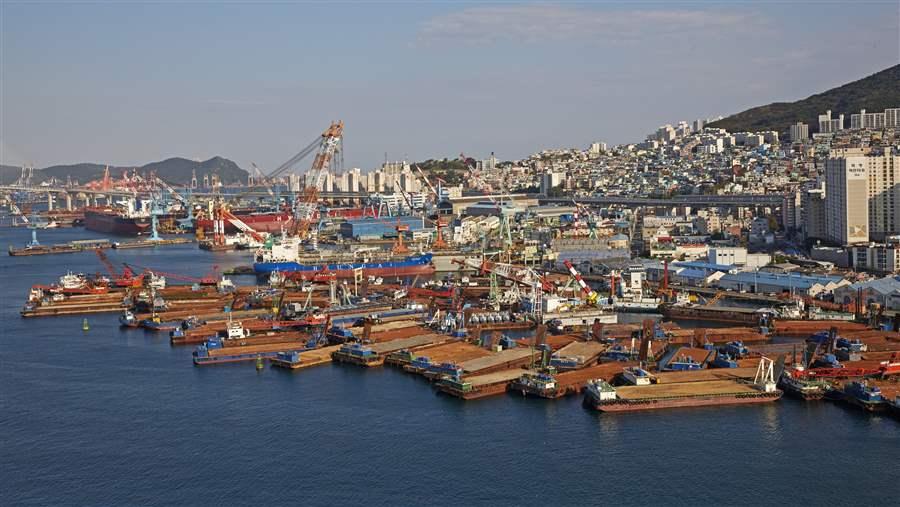10 Ways World Leaders Can Improve Fishery Management
Recommendations for the 32nd UN Committee on Fisheries meeting
 © Getty Images
© Getty ImagesInternational fisheries play a critical part in ensuring food and economic security around the world. Still, many fish populations are not managed according to scientific advice and best practices, a reality that is taking a toll on many important marine species.
Sustainably managing the world’s shared fish stocks, and securing the well-being of the habitats and ecosystems on which they depend, requires effective governance at every level. Policies must be informed by the best available science and backed by commitments from governments to enforce compliance.
When the United Nations Food and Agriculture Organization (FAO) Committee on Fisheries (COFI) meets July 11-15, member countries must take steps to end overfishing, protect sharks, combat illegal fishing, and safeguard marine habitats and ecosystems. Here are 10 ways they can have a positive impact:
1. Encourage sustainable fisheries management
The FAO’s biennial State of World Fisheries and Aquaculture (SOFIA) report, the organization’s global assessment of fisheries, can be improved. The FAO should take a precautionary approach and develop standards that are more transparent and conservative to help account for the scientific uncertainties frequently associated with determining stock status. The FAO Code of Conduct for Responsible Fisheries requires that fishing states and regional fisheries management organizations (RFMOs) apply the precautionary approach broadly, that they introduce measures to recover depleted stocks, and that they craft management objectives to ensure that fish stocks are sustainably managed.
2. Fully implement the international plan of action for sharks
COFI adopted the International Plan of Action for the Conservation and Management of Sharks nearly a decade ago, but implementation has been piecemeal and often inadequate. Countries and RFMOs must set strong management measures to guarantee that catch levels are sustainable for sharks around the world.
3. Support CITES management of sharks and rays
In 2013, the Convention on International Trade in Endangered Species of Wild Fauna and Flora (CITES) added five species of shark and two species of manta ray to its Appendix II, establishing international protections for regularly traded shark and ray species for the first time. At the CITES conference of the parties in September, members should adopt proposals to list thresher sharks, silky shark, and all species of mobula ray. Effective fisheries management measures complement CITES trade restrictions, helping to better protect these vulnerable shark and ray species.
4. Improve data and catch reconstruction
The Sea Around Us research initiative at the University of British Columbia has worked to find ways to improve the quality and accuracy of fisheries data worldwide. Reliable catch data are essential to implementing effective fisheries management and can help states identify trends in catch and changes in important fisheries. The information then can be used to detect overfishing, protect small-scale fisheries, and focus resources on improving data collection efforts.
5. Reduce Illegal fishing through catch documentation
Catch documentation schemes (CDS) play a valuable role in mitigating illegal, unreported, and unregulated, or IUU fishing. When implemented fully, these schemes help ensure that catch is legal and traceable. RFMOs work under mandates to conserve and rebuild fish stocks; they must adopt CDS requirements and not let trade issues take precedence over the primary goal of sustainability.
6. Implement the Port State Measures Agreement
The FAO’s Port State Measures Agreement entered into force in June after securing more than the required number of governmental ratifications. The agreement’s uniform approach provides cost-effective ways to stop illicitly caught fish from entering the market. To ensure effective implementation, COFI members must marshal additional resources to fund a well-trained fisheries inspectorate that benefits from strong communication and coordination among port, flag, and coastal states as well as relevant regional and global bodies.
7. Identify and register all fishing vessels with a single global system
The International Maritime Organization (IMO) number is the only unique and permanent vessel identifier that can provide an independent and continually updated audit trail of data. COFI members agreed in 2014 that the IMO number should be used for the Global Record of Fishing Vessels. To date, 10 RFMOs and other regional organizations have mandated that larger vessels obtain and report IMO numbers.
8. Improve vessel tracking standards
FAO members must recognize the importance of port-to-port vessel tracking as a key instrument for monitoring, control, and surveillance of fishing activities. In addition, states must strengthen and accelerate efforts to enact and implement effective vessel monitoring scheme (VMS) requirements while fostering regional approaches to support management of shared resources.
9. Develop guidelines to ensure the transparency of at-sea transshipment
Transshipment of catch at sea, particularly in the longline industry, can allow illegally caught fish to get to market unless it is adequately regulated and controlled. The FAO should consult with leading experts to develop technical guidelines for best practices to ensure that transshipment activities are transparent, accountable, and verifiable. In the interim, COFI members should ban all forms of transshipment at sea until measures are in place to detect and deter illegal catch transfers.
10. Follow through on recommendations in the recent review of the Fish Stocks Agreement
In May 2016, nations that are parties to the U.N. Fish Stocks Agreement convened in what is known as a resumed Review Conference to evaluate their progress toward full implementation of the pact, which was adopted in 1995. The conference recommendations could improve stock health and implementation of legal obligations under the agreement but must be enacted in national legislation or in RFMOs to result in real change on the water.
Elizabeth Wilson directs Pew’s international ocean policy work.












